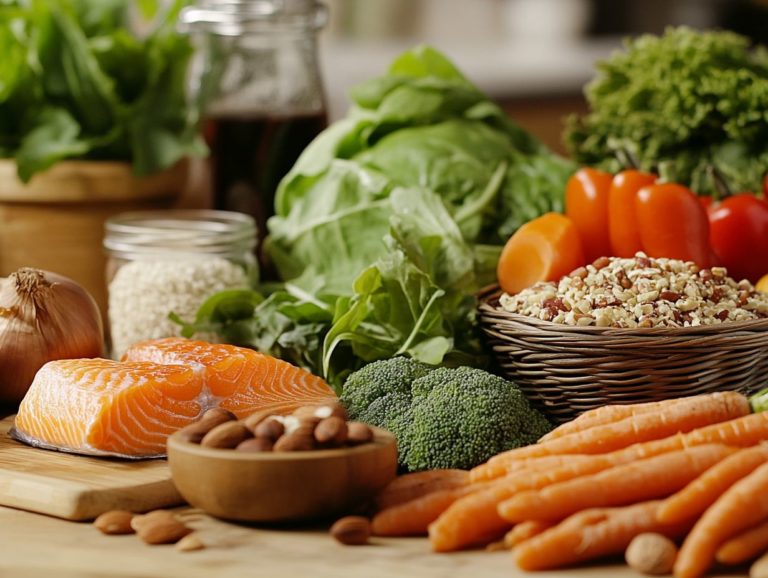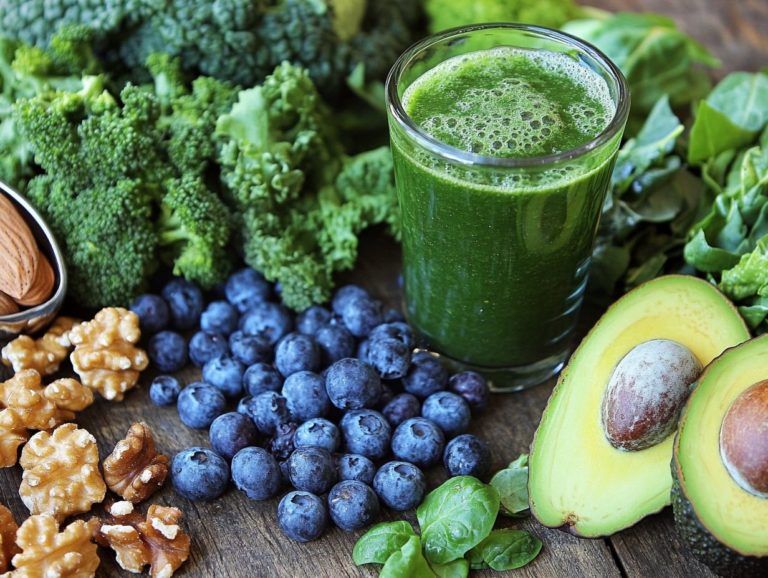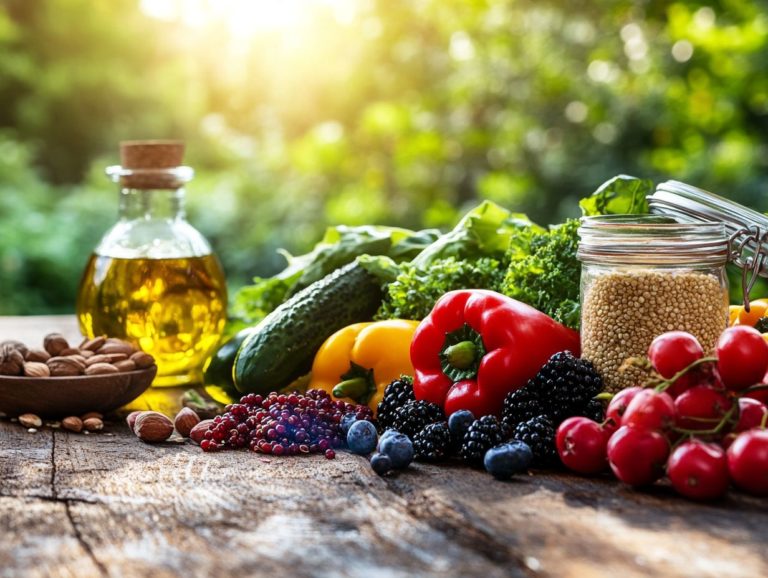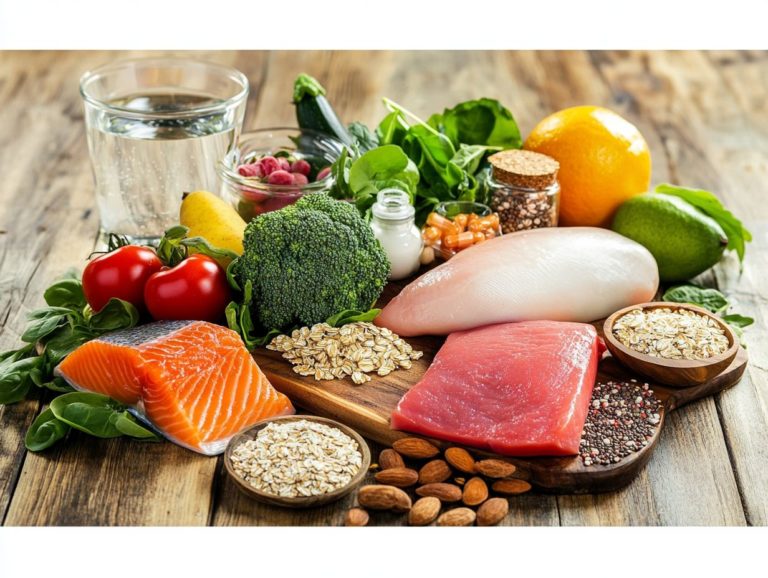10 Nutrient-Dense Foods for Seniors: Health Boosters
As you age, maintaining optimal health becomes increasingly essential, and one of the most effective ways to achieve this is through a nutrient-dense diet. Start including these foods in your diet today for a healthier tomorrow!
This article delves into ten powerhouse foods that can significantly enhance your well-being and address your unique nutritional needs. From vibrant leafy greens to creamy yogurt, each food offers a plethora of benefits designed to tackle age-related health concerns.
You ll also find helpful tips on incorporating these foods into your daily meals, ensuring that your loved ones receive the nutrition they require.
Dive into these delicious foods!
Contents
- Key Takeaways:
- 1. Leafy Greens
- 2. Berries
- 3. Fatty Fish
- 4. Nuts and Seeds
- 5. Whole Grains
- 6. Avocados
- 7. Eggs
- 8. Yogurt
- 9. Lean Protein Sources
- 10. Beans and Legumes
- Why Are Nutrient-Dense Foods Important for Seniors?
- Frequently Asked Questions
- What are nutrient-dense foods?
- Why are nutrient-dense foods important for seniors?
- What are some examples of nutrient-dense foods for seniors?
- How do nutrient-dense foods boost seniors’ health?
- How can seniors incorporate nutrient-dense foods into their diet?
- Are there any specific nutrient-dense foods that are particularly beneficial for seniors?
Key Takeaways:
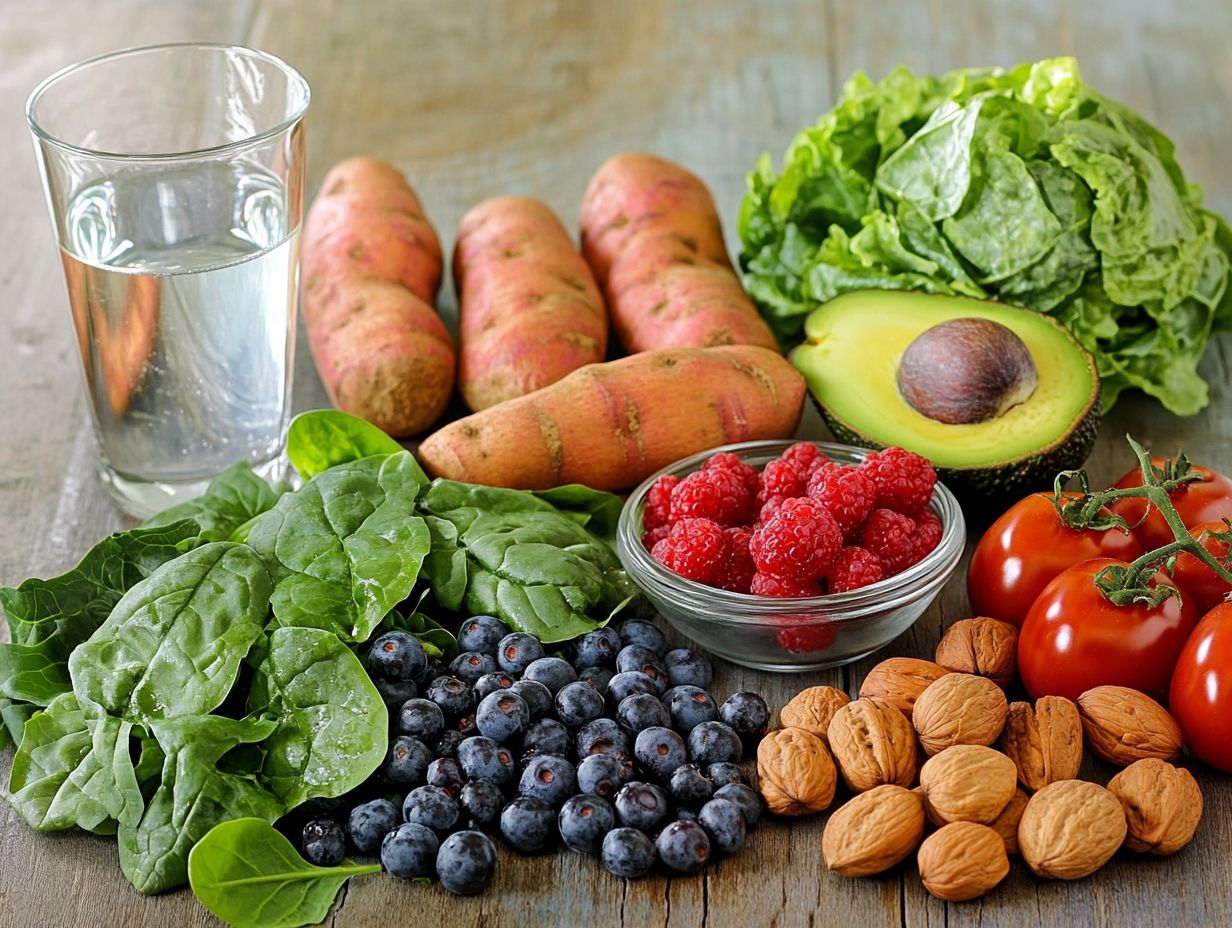
- Leafy greens, berries, fatty fish, and nuts/seeds are nutrient-dense foods that provide essential vitamins and minerals for seniors.
- Incorporating nutrient-dense foods into meals can help with age-related health concerns and ensure seniors are getting necessary nutrients.
- Caregivers can help seniors by finding creative ways to incorporate nutrient-dense foods into meals and avoiding processed, high-sugar options.
1. Leafy Greens
Leafy greens, such as spinach and kale, are essential superfoods for you, offering a treasure trove of antioxidants substances that help combat cell damage and vital nutrients that contribute to a balanced diet. They help prevent chronic diseases and support your overall health and energy levels.
Packed with high levels of vitamins K, A, and C, along with iron and calcium, these greens are crucial for maintaining cognitive function and heart health. Vitamin K is vital for blood clotting and bone health. Vitamin A supports your vision and immune function.
Meanwhile, vitamin C boosts your immune system and aids in iron absorption, promoting your energy and vitality. By incorporating leafy greens into your meals, you can enjoy delicious, nutrient-rich options that not only tantalize your taste buds but also fortify your body against age-related health issues.
2. Berries
Berries, especially blueberries, are nutritional powerhouses teeming with antioxidants that can enhance cognitive function while offering a delightful and healthy snack option for you.
These tiny fruits, along with strawberries and raspberries, are essential in combating oxidative stress, an imbalance in the body that can lead to aging and a host of health issues.
If you’re looking to boost your intake of these vibrant gems, the possibilities are abundant. You might consider tossing a handful into your morning oatmeal or blending them into a refreshing smoothie for an invigorating burst of flavor and nutrition.
They re also a fantastic addition to salads, providing both color and a natural sweetness that can elevate any dish. Baking with berries in muffins or yogurt parfaits presents yet another delightful way to savor their numerous health benefits.
3. Fatty Fish
Fatty fish, particularly salmon, are your go-to sources of omega-3 fatty acids, which are fantastic for supporting heart health and delivering high-quality protein. This makes them an excellent choice for anyone, especially seniors, aiming for a nutrient-dense diet.
Incorporating these beneficial fats into your daily meals can yield impressive results, such as lowering cholesterol levels and boosting cognitive function. Research consistently underlines the positive effects of omega-3s on cardiovascular health, reducing the risk of heart disease while also nurturing brain vitality.
To reap these rewards, consider adding fatty fish to your meal plans in enjoyable and delicious ways. Here are some easy ways to enjoy fatty fish:
- Grilled salmon over a vibrant salad
- Canned tuna mixed into whole-grain pasta for a hearty dish
- Baked trout served alongside an array of colorful vegetables
These simple tweaks not only elevate your nutrition but also pave the way for a healthier lifestyle. Try these delicious fish recipes this week!
4. Nuts and Seeds
Nuts and seeds serve as exceptional sources of healthy fats and protein. They make a nutrient-dense snack that promotes cardiovascular health and overall wellness for seniors.
Among the most beneficial options, you’ll find almonds and chia seeds. Both are brimming with calcium, protein, and heart-healthy omega-3 fatty acids. When you’re in need of a quick and easy snack, just reach for a handful of almonds about 1 ounce. This simple choice provides energy while supporting your bone health.
Chia seeds can easily be sprinkled over yogurt or blended into smoothies. About 2 tablespoons of these tiny powerhouses offer a fantastic source of fiber and essential nutrients.
By incorporating these snacks into your daily routine, you elevate your nutrient intake and contribute to a balanced diet that delivers satisfaction without piling on excessive calories.
5. Whole Grains
Whole grains, rich in complex carbohydrates and fiber, play a crucial role in maintaining your energy levels and fostering a healthy digestive system as you age.
These nutritional powerhouses provide a consistent source of energy throughout the day. They also deliver essential vitamins and minerals that support your overall health. Incorporating whole grains like oatmeal and brown rice into your daily meals can be a genuinely rewarding experience.
For breakfast, you might savor a warm bowl of oatmeal adorned with fresh fruit or nuts. Brown rice can serve as a delightful base for stir-fries or salads at lunch and dinner.
By making simple adjustments, such as swapping out refined grains for whole grain options, you can effortlessly enjoy the myriad health benefits these wholesome foods offer.
6. Avocados
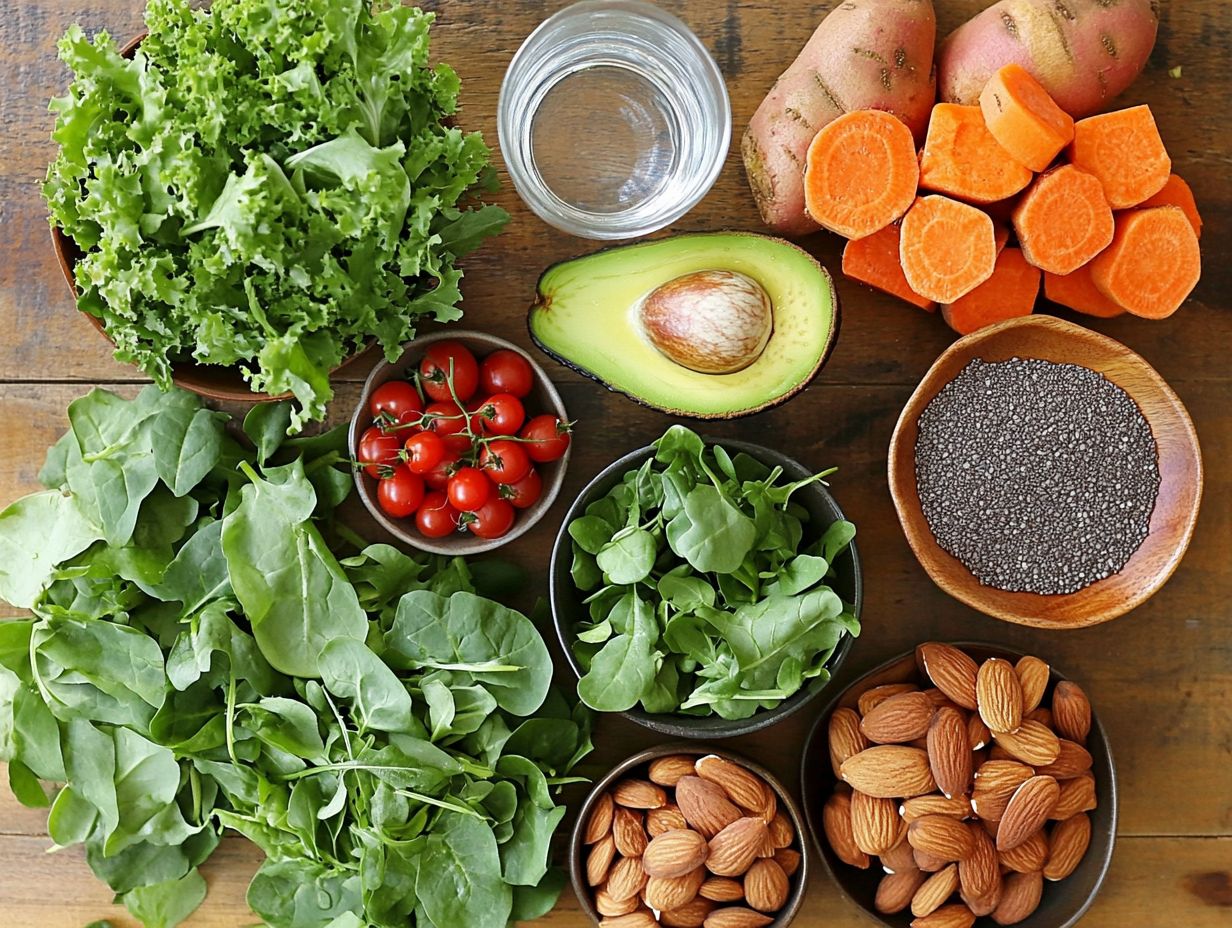
Avocados are a nutrient-rich superfood brimming with healthy monounsaturated fats and essential vitamins. They play a vital role in supporting heart health and overall wellness, particularly for seniors.
These fruits are packed with potassium, fiber, and antioxidants. Together, they work harmoniously to lower bad cholesterol levels and keep blood pressure in check.
To seamlessly incorporate avocados into your daily meals, consider adding sliced avocado to your salads. You can blend it into smoothies for a creamy texture or spread it on whole grain toast with a dash of salt and pepper. For a nutritious snack, mash them into guacamole, which pairs perfectly with veggie sticks or whole grain crackers.
This makes avocados a versatile and delectable addition to any diet. Don t miss out on the benefits!
7. Eggs
Eggs are a great food, packed with nutrients that can elevate your diet, especially as you age. They offer high-quality protein, vitamin B12, and essential amino acids all vital for maintaining your health.
These nutrients support your well-being and play a crucial role in preserving muscle mass and enhancing cognitive function. Regularly indulging in eggs can help you maintain mobility and independence. They also nurture your brain health to improve memory and cognitive abilities.
If you’re keen on incorporating eggs into your meals, think of simple yet delicious options like scrambled eggs with spinach, veggie-packed omelets, or classic egg salad sandwiches. You might also enjoy baking them into muffins or frittatas for a delightful breakfast boost.
Make sure to enjoy all the benefits of this nutritional powerhouse!
8. Yogurt
Greek yogurt stands out as an exceptional source of probiotics good bacteria that supports digestion and calcium. It is a remarkable addition to your diet, especially for enhancing gut health and fortifying bone strength.
The beneficial bacteria present in this tangy delight work wonders in balancing gut flora. This results in improved digestion and relief from common issues like bloating and constipation.
But it doesn’t stop there; there are countless creative ways to indulge in Greek yogurt, elevating both its flavor and nutritional profile. You can use it as a creamy base for smoothies, providing a protein boost, or as a delightful topping for fruits and nuts.
Many find joy in incorporating it into healthy dressings or dips, perfectly complementing meals or snacks. This way, you not only enjoy the health benefits but also savor every delicious bite.
Explore these foods today and enhance your health!
9. Lean Protein Sources
Lean protein sources, like chicken and turkey, are essential pillars of a healthy diet for seniors. They provide the vital amino acids the building blocks of protein and iron necessary for maintaining energy and preserving muscle mass.
Consider adding fish, like salmon and tuna, to your meals. These options pack a punch with omega-3 fatty acids, which support heart health and are crucial for reducing the risk of cardiovascular diseases.
Make sure to include delicious plant-based proteins! Lentils, chickpeas, and quinoa not only offer protein but also provide fiber that aids digestion and promotes a sense of fullness.
Start adding these lean proteins to your meals today! You’ll be supporting muscle preservation and bolstering your immune system with vital nutrients that help fend off illnesses. A balanced diet that includes a variety of these protein sources is essential for fostering longevity and vitality in your golden years.
10. Beans and Legumes
Beans and legumes are exceptional sources of plant-based protein and fiber, making them ideal choices as you enhance your nutrient-dense diet.
These versatile ingredients come in various forms, such as black beans, lentils, chickpeas, and kidney beans, each offering its unique flavors and textures. Rich in essential nutrients, they help you maintain a healthy weight while working to lower cholesterol levels and supporting your overall heart health.
Incorporating these options into your daily meals can be effortless. Consider adding them to soups, salads, or even using them as a base for delicious veggie burgers. With each serving, you ll enjoy a delightful way to boost your fiber intake and promote better digestion, paving the way for a heart-healthy lifestyle.
Why Are Nutrient-Dense Foods Important for Seniors?
Nutrient-dense foods are crucial for seniors, offering the essential vitamins, minerals, and antioxidants needed to maintain health, prevent illness, and combat chronic diseases. For more insights, explore nutrition for active seniors: staying energized. Eating nutrient-dense foods can dramatically improve your quality of life today!
This approach supports your physical health and plays a vital role in boosting cognitive function and energy levels. By incorporating a diverse array of fruits, vegetables, whole grains, and lean proteins into your meals, you can experience improved memory, sharper thinking, and sustained energy throughout the day.
Nutrient-rich foods are linked to longevity, helping to reduce inflammation and promote heart health. Embracing such a balanced diet fosters a greater sense of well-being, enabling you to remain active and engaged in your daily life, ultimately leading to a happier and healthier aging process.
What Are the Specific Nutrients That Seniors Need?
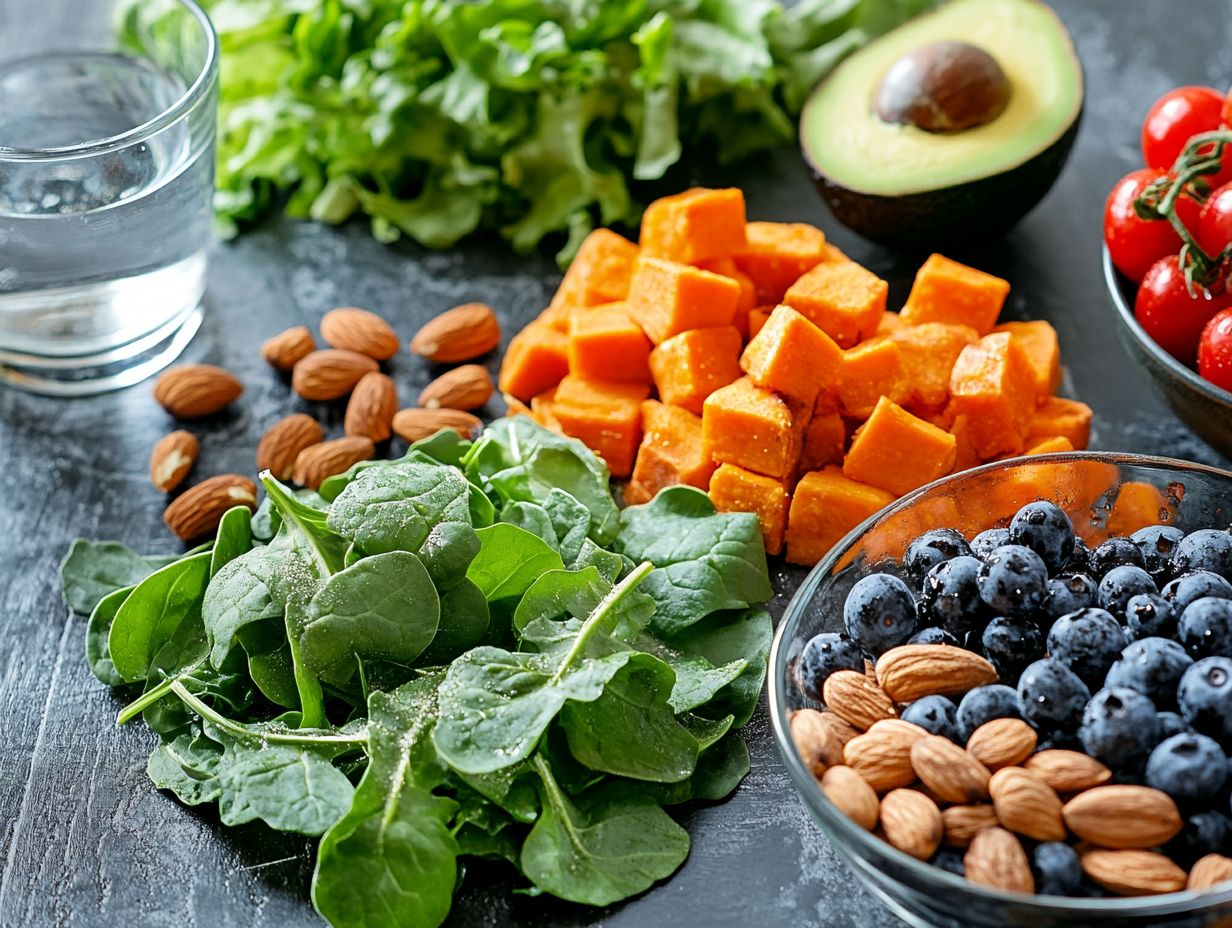
Seniors need specific nutrients like vitamin B12, calcium, and iron to support their health, helping them maintain energy levels, strong bones, and cognitive function.
These essential nutrients play pivotal roles in enhancing overall well-being, especially as the body navigates the changes that come with age. Vitamin B12 is crucial for nerve health and the formation of red blood cells, while calcium helps stave off osteoporosis, a common concern for older adults. Iron, meanwhile, is vital for transporting oxygen in the blood, effectively combating fatigue.
To weave these nutrients seamlessly into daily meals, seniors can savor options like fortified cereals or eggs for B12, leafy greens or yogurt for calcium, and lean meats or legumes for iron. Simple swaps like adding spinach to an omelet or enjoying a glass of fortified plant milk can make a significant impact on nutritional intake.
Unlock the Power of Nutrient-Dense Foods!
Nutrient-dense foods can be your best allies in tackling age-related health concerns. They re packed with antioxidants and essential nutrients that fight oxidative damage and lower the risk of chronic diseases.
These foods are essential for maintaining heart health and preventing cognitive decline, which are common challenges as you age. For example, incorporating omega-3 fatty acid-rich foods, such as walnuts and fatty fish, can be a game changer for cardiovascular wellness. Pairing leafy greens with berries creates a powerhouse of nutrients that may enhance your brain function.
Kickstart your day with a delicious bowl of oatmeal topped with sliced bananas and a sprinkle of cinnamon not only does this combo provide vital fibers for your heart, but it also delivers cognitive benefits. By embracing these superfoods, you can actively nurture your health journey in your golden years.
Creative Ways to Add Nutrient-Dense Foods to Your Meals
Incorporating nutrient-dense foods into meals can be a fun endeavor! Whether you opt for meal delivery services, modify recipes, or use engaging cooking strategies, healthy eating can be enjoyable for seniors.
Explore simple and delicious ways to include superfoods in daily diets and significantly enhance the nutrients for those in your care. Imagine whipping up smoothies featuring spinach, avocado, and berries quickly blended for a refreshing breakfast or snack!
Enrich salads with quinoa, walnuts, and vibrant vegetables for a bounty of vitamins and minerals while keeping flavors delightful. For on-the-go snacks, prepare energy balls with oats, nut butter, and chia seeds easy to make and packed with goodness.
These small adjustments can elevate meals and promote a healthy lifestyle that seniors will genuinely appreciate.
What Nutrient-Dense Foods Should Seniors Avoid?
While many foods offer remarkable benefits, seniors on certain medications like Coumadin should avoid specific nutrient-dense options that might clash with prescriptions.
For example, leafy greens packed with vitamin K, such as kale and spinach, can disrupt the effectiveness of medications and impact blood clotting. Likewise, grapefruit and its juice are known for affecting the metabolism of various drugs, potentially leading to unintended side effects.
To maintain a nutrient-rich diet without the risks, consider alternatives like berries, which are brimming with antioxidants, or cruciferous vegetables such as broccoli and cauliflower, which deliver essential vitamins with minimal concerns. Thoughtful dietary adjustments ensure you receive vital nutrients while effectively managing your health.
How Can Caregivers Ensure Seniors Get Enough Nutrient-Dense Foods?
Caregivers play a vital role in ensuring seniors enjoy a diet rich in nutrient-dense foods. By employing strategies like meal planning, utilizing food assistance programs, and providing ongoing education about healthy choices, they can make a significant impact.
To support this mission, familiarize yourself with the Supplemental Nutrition Assistance Program (SNAP). It opens the door to a wide array of nutritious food options that can elevate your senior’s dining experience.
Make grocery shopping a collaborative venture; involving seniors in the selection process uplifts their spirits and encourages exploration of exciting new flavors.
Cooking together transforms meal prep into a cherished bonding experience, ensuring meals are balanced and satisfying. Crafting a weekly meal plan that emphasizes portion control and diversity helps seniors meet their dietary needs and enhances their health and well-being.
Watch this video to learn more about incorporating nutrient-dense foods!
Frequently Asked Questions
Here are some common questions about nutrient-dense foods and seniors health.
What are nutrient-dense foods?
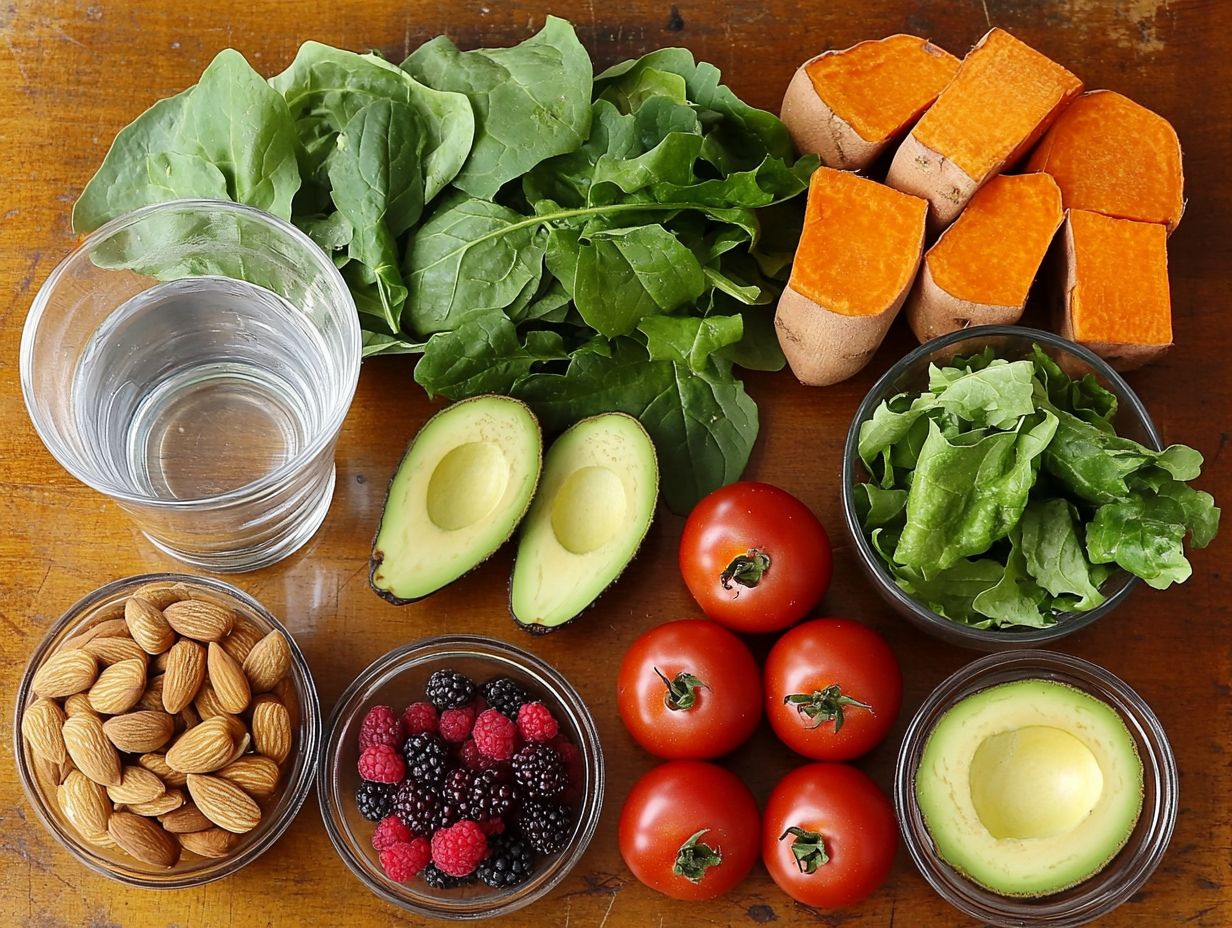
Nutrient-dense foods are those that are high in essential nutrients like vitamins, minerals, and substances that help protect the body from damage, while being relatively low in calories. These foods offer a variety of health benefits and are essential for vibrant health and longevity!
Why are nutrient-dense foods important for seniors?
As we age, our bodies require more nutrients to support proper functioning and maintain good health. Nutrient-dense foods give seniors essential vitamins, minerals, and antioxidants to boost their immune system, support bone health, and enhance cognitive function.
What are some examples of nutrient-dense foods for seniors?
Some nutrient-dense foods particularly beneficial for seniors include:
- Leafy greens, rich in vitamins and minerals
- Berries, packed with antioxidants
- Fatty fish, such as salmon, high in omega-3 fatty acids for heart and brain health
- Nuts and seeds, providing healthy fats and protein
- Legumes, a great source of fiber and protein
- Whole grains, which help with digestion
- Lean protein sources like chicken and tofu, vital for muscle maintenance
How do nutrient-dense foods boost seniors’ health?
Nutrient-dense foods provide seniors with essential vitamins and minerals that support their immune system and protect against chronic diseases. Incorporating nutrition for seniors: tips for healthy aging can also give seniors energy and help them maintain a healthy weight.
How can seniors incorporate nutrient-dense foods into their diet?
Seniors can easily include nutrient-dense foods in their meals by incorporating a variety of fruits, vegetables, whole grains, and lean protein sources. Additionally, snacking on superfoods for healthy aging like nuts, seeds, and berries throughout the day is also a great option!
Are there any specific nutrient-dense foods that are particularly beneficial for seniors?
Yes, certain nutrient-dense foods are especially beneficial for seniors. For instance, fatty fish like salmon are rich in omega-3 fatty acids that support heart and brain health, while leafy greens are loaded with vitamin K, promoting strong bones. Incorporating nutrition for seniors: superfoods for longevity can further enhance overall well-being.

